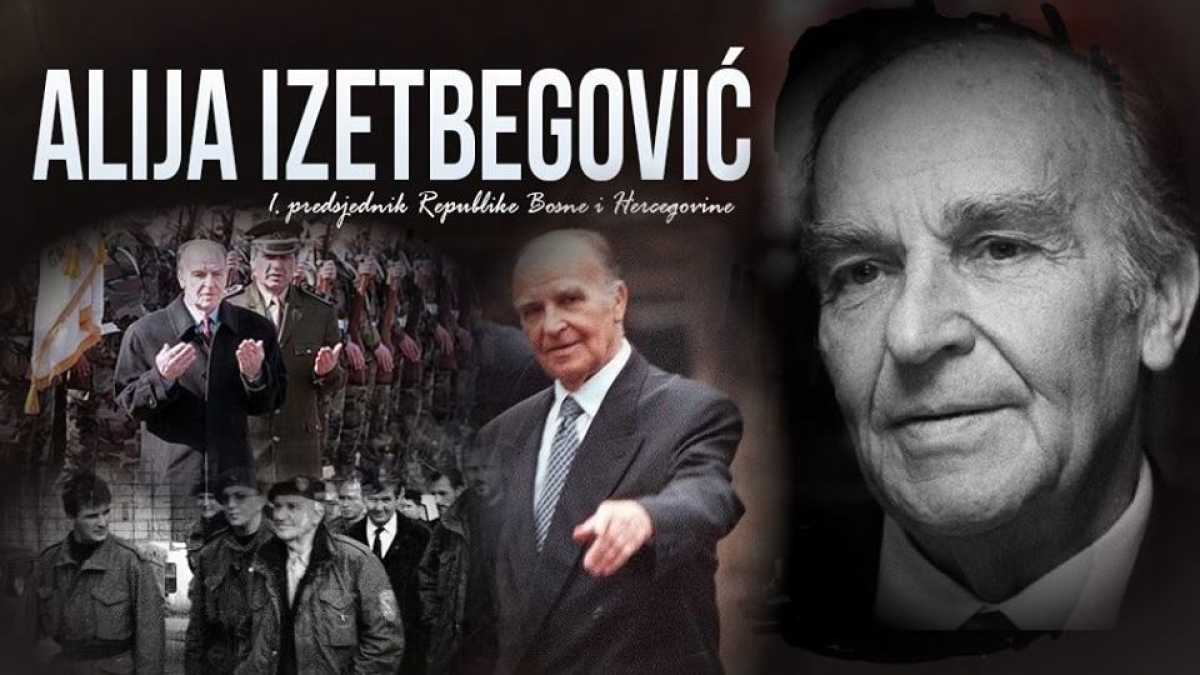Islam 'Principle of Organization of Universe'

October 19 marks the 16th anniversary of the death of Alija Izetbegovic, independent Bosnia’s first president and one of most important Muslim thinkers of the last century.
Izetbegovic -- a politician, writer, lawyer and philosopher who came to international prominence during the bitter 1992-1995 Bosnian war -- is commemorated every year on his death anniversary.
Having struggled against fascism and Chetnik nationalists during the Second World War and communism afterwards, Izetbegovic fought for the independence of Bosnia Herzegovina from Yugoslavia in the 1990s.
Izetbegovic, often dubbed the "Wise King", died in Sarajevo on Oct. 19, 2003 of natural causes, having served as president of the Republic of Bosnia and Herzegovina from 1992 to 1996 and as chairman of the Bosnian presidency until October 2000.
Intellectual heritage: Understanding Izetbegovic's ‘Islamic’ view
Though he is mostly known as a politician thanks to his successful leadership in securing Bosnian independence, Izetbegovic is also one of the most important Muslim thinkers of the 20th century Europe.
Through his ideas, he addressed not only the Muslims in Bosnia and Herzegovina, but across the globe.
He is the author of several books, most notably Islam Between East and West and Declaration of Islam.
In his well-known 'Declaration of Islam' in 1970, Izetbegovic thoroughly examined the independence, awakening and the expansion of contemporary Islamic thought, as well as the revival of the Muslim world, the relationship between the West and the Islamic world and how to build a new civilization.
His writings brought him to a run in with the Yugoslav authorities. Along with 12 other Bosniak scholars, he was jailed for 14 years after being accused of "separatism and establishing an Islamic state" in 1983, only to be released five years later.
Islam Between East and West
As the contemporary world finds itself in a long-standing and unpredictable ideological clash, Izetbegovic's magnum opus, Islam Between East and West, discusses Islam’s reaction to these conflicts and whether there was a role for Islam to play in the formation of the present world.
"The book deals with dogmas, institutions, and teachings of Islam with the aim of establishing the place of Islam in the general spectrum of ideas," Izetbegovic wrote in his book.
Izetbegovic outlined three integral views of the world, being the "religious", "materialistic" and "Islamic", which he argues reflect three "elemental possibilities": the "conscience", "nature" and "man".
He asserts that each of these integral world views manifests itself as Christianity, materialism, and Islam.
The first takes as its starting point the existence of the spirit, the second the existence of matter, and the third the "simultaneous existence of spirit and matter".
From a holistic approach, he underlines that Islam is the name for the "unity of spirit and matter", the highest form of which are humans.
Highlighting an "inherent harmony between man and Islam", he stresses that ''in the same way as humankind is a unity of spirit and body, Islam is a unity of religion and social order.''
This unity, which is foreign both to Christianity and materialism, is basic and the "most Islamic" characteristic of Islam, he highlights.
Izetbegovic argues that Islam is not only a religion or a way of life but primarily the "principle of the organization of the universe".
Overcoming 'primeval' universal dualism
Izetbegovic criticizes the "all-encompassing dualism" of the human world, exemplified by the "insurmountable" conflicts between spirit and body, and religion and science.
Exploring man's capability to overcome this contradiction, he finds that Islam dictates first the understanding and acceptance of this "primeval" dualism of the world, and then to overcome it.
"Islam means the call to create a man harmonious in his soul and body and a society whose laws and socio-political institutions will maintain and not violate this harmony," stresses Izetbegovic.
Islam is, and should be, a "permanent searching through history" for a state of "inward and outward balance", he argues.
This is the "aim of Islam today", and will be its "specific historical duty" in the future, Izetbogovic highlights.
Ideological, political independence of Muslim countries
Based on his philosophical understanding of Islam, he also criticizes the contentious division of the world into two opposing camps, based in ideological conflict.
Izetbegovic was one of the few Muslim intellectuals who stood against the East-West categorization, Ibrahim Kalin wrote in an article published in Turkish newspaper Sabah on Dec. 26, 2014.
"Today, we are faced with two worlds divided to the core, politically, ideologically, and emotionally," Izetbegovic says.
Underlining that Islam by its very nature is ideologically and politically independent, he calls on Muslims to free themselves from external influences.
He highlights that ''opposed ideologies with their extreme forms'' cannot be imposed on mankind, and points out to a need for a new "middle position".
"Islam, which occupies a central position between East and West, has to become conscious of its own mission as an "intermediary" nation in the divided world," he stresses.
( Source: Anadolu Agency )
Topics: Alija Izetbegovic, Bosnia And Herzegovina, Islam, Materialism, Muslims In The West, Spiritual
Views: 2098
Related Suggestions

















